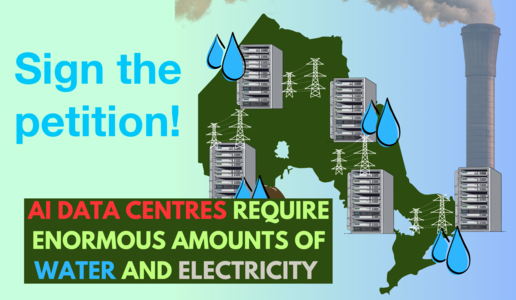100 signatures reached
To: Premier Ford and Ontario Energy Minister Stephen Lecce
Say NO to AI Data Centres in Ontario!

Building AI data centres in Ontario will leave Ontarians with higher hydro and water bills, more pollution, and long-term environmental damage. These projects create few local jobs, strain our grid and natural resources, and rely on a shaky business model that could leave the province locked into costly infrastructure with little economic return. Say NO to AI Data Centres in Ontario.
Why is this important?
There are major ramifications that Premier Ford and Energy Minister Stephen Lecce should know with respect to AI data centres:
- The major beneficiary of building new AI data centers in Ontario are American companies. Most notably, a single American company: NVIDIA. AI data centers are, essentially, warehouses for Graphics Processing Units, or GPUs. The GPU market is widely understood as a de facto monopoly, with NVIDIA controlling more than 90% of the sales of GPUs (Yahoo Finance, 2025). NVIDIA -- an American company with close ties to the Trump administration (Rapoza, 2025) -- benefits first and foremost from the sale. That is, the primary beneficiary of such a deal is an American company, not an Ontarian or even a Canadian one.
- Rising electricity and water bills for residents and businesses: Paying higher water and electricity bills will make life more unaffordable for millions of residents and businesses across Ontario. In the U.S., new data centres have already notably increased electricity bills in many cities and small towns.
- AI data centers contribute to massive increases in GHG emissions, particularly from fossil fuels.
- AI data centres require massive amounts of water and electricity (particularly from fossil fuels and nuclear), negatively impacting the environment. For instance, “across the globe, Microsoft’s 300 data centres consume more than 125 million litres of water per facility each year. That’s the equivalent of 15,000 Olympic size swimming pools filled with water at each data centre.” Moreover, “by 2030–2035, data centers could account for 20% of global electricity use, putting an immense strain on power grids.” It is crucial to respect nature. There is no economy without clean air, clean water, and a healthy ecosystem. Humans cannot survive without a healthy environment. In other words, we cannot prioritize short-term economic growth over the environment. As stated by Golestan (Sally) Radwan, the Chief Digital Officer of the United Nations Environment Programme (UNEP), “Governments are racing to develop national AI strategies but rarely do they take the environment and sustainability into account. The lack of environmental guardrails is no less dangerous than the lack of other AI-related safeguards.”
- Local, marginalized communities face disproportionate costs and health impacts: In South Memphis, an overwhelmingly Black neighbourhood has seen a sharp rise in asthma attacks and other respiratory problems since xAI’s data centre began operating there in June 2024. xAI is now facing legal action by the NAACP over air pollution.
- Excessive E-waste and mineral extraction: Data centres produce large amounts of electronic waste, which often contains hazardous substances like mercury and lead. To explain, “the short lifespan of GPUs and other HPC components results in a growing problem of electronic waste, as obsolete or damaged hardware is frequently discarded. Manufacturing these components requires the extraction of rare earth minerals, a process that depletes natural resources and contributes to environmental degradation.”
- Lack of transparency: There is a lack of transparency and accountability of AI data centres. To tackle this, there needs to be more opportunities for public engagement and real consultation with climate groups, human rights organizations, and local communities. Throughout the whole process, Indigenous communities must be a partner in the decision-making process and treaty rights must be respected at all times.
- Uncertainty in the business model of AI data centres: Many data centres have yet to prove that they have a viable business model. Currently, most generative AI services are available for free and it is uncertain whether AI-users would be willing to pay for these services if there was a charge. “The scale of the investment is sparking concerns about a bubble and the potential for a pop that could bring the stock market crashing down from record heights…The money spent this year on AI infrastructure and software has contributed more to GDP growth than consumer spending, according to Renaissance Macro Research's reading of Bureau of Economic Analysis data.”
- Minimal economic gains for the local community and few new jobs: AI data centres can be expected to create only a handful employment opportunities (sometimes just 10-100 jobs per facility), spurring minimal long-term economic gains to local residents. Many operations jobs for running AI data centres can be done remotely as well, employing workers that are not local, even overseas. We are opposed to economic growth that is not distributed equally and make wealthy tech investors and business owners even wealthier.
